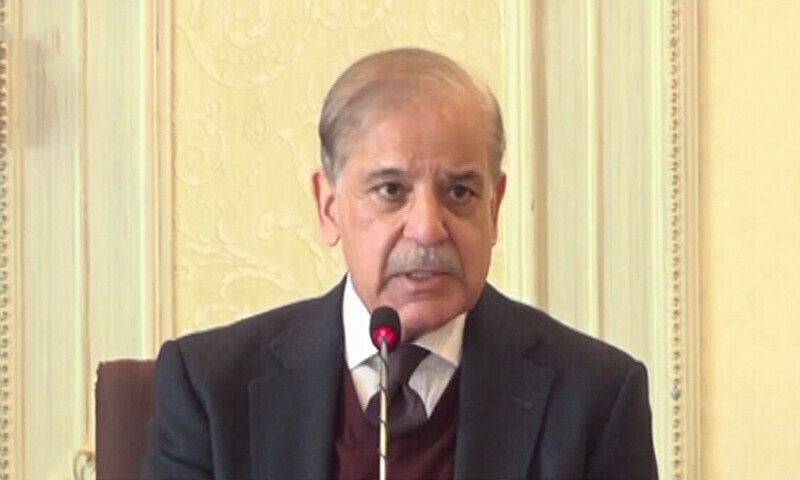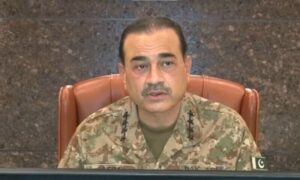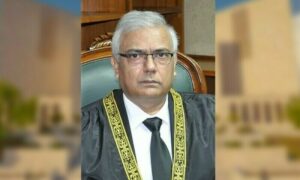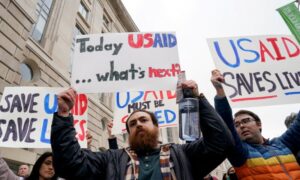Prime Minister Shehbaz Sharif on Tuesday said that the government would unveil the Ramazan relief package this year without the Utility Stores Corporation (USC)’s role to prevent corruption and distribution of low-quality commodities to people.
In January, the federal cabinet formed a high-level committee to develop a comprehensive strategy for the prompt shutdown of USC operations nationwide.
Traditionally, the prime minister’s Ramazan package is offered to the general public through utility stores. However, the committee was also tasked to prepare a strategy for providing the Ramazan package in coordination with the Benazir Income Support Programme (BISP).
In the budget, the allocation for USC nearly doubled from the previous year. In the recent past, there have been different proposals to restructure the corporation to improve its finances or close 1,000 loss-making outlets nationwide. There are about 5,130 stores nationwide, according to media sources.
While addressing a federal cabinet meeting in Islamabad, the premier said, “As the Holy Ramazan is about to start, I have asked the Ministry of National Food Security to bring about a Ramzan Package without the Utility Stores to prevent corruption and the sale of low-quality material.
“I had asked many months ago that this cannot go on with the Utility Stores,” the premier said.
He told the cabinet members that last year, the government had received immense complaints about the execution of the Ramazan package by the Utility Stores Corporation.
Regarding the polio vaccination drive, he mentioned that a policeman, who was deployed for the security of the polio team, was killed in Jamrud, adding that his sacrifice was not in vain.
The premier also lauded the services of the polio team “for their tireless efforts to rid the country of this crippling disease”.
Apprising the cabinet members of his Quetta visit on Monday, the prime minister said he had paid a visit to the security personnel who were injured during an anti-terror operation in Kalat.
The military’s media affairs wing on Feb 1 had said that 18 soldiers were martyred, and 23 terrorists were killed in various sanitisation operations in Balochistan.
“I met the injured — they were in high morale and were even ready to sacrifice their lives for the country,” he said, adding that the “soldiers of the army, police, FC and Rangers sacrificing their lives were actually bearing the brunt of the blunderous policies of a government in the past when thousands of terrorists were set free”.
Prime Minister Shehbaz Sharif also said that his government was committed to taking the country towards economic growth, citing ease in inflationary pressure.
The annual inflation maintained a decelerating trend, hitting a nine-year low at 2.4 per cent year-on-year in January, mainly due to a decline in prices of perishable food products.
The headline inflation, measured by the Consumer Price Index (CPI), decreased to 9.6pc in August 2024, the first single-digit figure in more than three years, and the path of slowing down continued in the following months.
However, a rising trend was witnessed in the prices of sugar, vegetables and edible oils in the domestic market despite declining prices in the international market. The government has allowed sugar exports, especially to Afghanistan, on the plea of surplus stock.
The premier expressed confidence in achieving economic growth, noting a decline in inflation numbers.
PM Shehbaz pointed out that the inflation had come down to a nine-year low of 2.4 per cent, commending the finance ministry for its efforts“during the past 11 months to bring the inflation down to the lowest level“.
“Now, we are fully striving to head toward economic growth. This is the main challenge. All of our energies will be focused on economic growth. Just like other targets, we will achieve this too,” he resolved.
Furthermore, the premier expressed his gratitude towards Sindh and Balochistan for approving the agriculture tax — to meet the requirements of the International Monetary Fund (IMF) programme.
On Monday, in a rare show of unity, the Sindh provincial assembly unanimously passed the Sindh Agricultural Income Tax Bill.
Punjab and Khyber Pakhtunkhwa had already passed the amended agricultural income tax law that was a part of the federal government’s commitments under the IMF’s $7 billion agreement spanning 37 months.
Shehbaz went on to mention the $1.2 billion agreement with Saudi Arabia, emphasising that it would strengthen foreign exchange reserves.
He also commended another deal with the Saudi Development Fund, which will provide $41 million for a water scheme in Mansehra, according to the report.
A day ago, Pakistan and Saudi Arabia signed two $1.61 billion agreements — one about oil import on deferred payment for one year and the other to a water scheme.
The deferred payment for oil import will be worth $1.20bn for one year while the concessional loan deal for the construction of a gravity-flow water scheme at Mansehra will amount to $41 million.
The premier also paid tribute to security personnel for rendering their lives to eliminate terrorism and ensure peace in the country.
He said, “These sacrifices will always be written in golden words in history”.
Shehbaz also stated that the Ministry of National Food Security had been directed to come up with a Ramazan package, excluding the Utility Stores Corporation, in order to ensure transparency and the provision of quality items to the public at subsidised rates during the month.
- Desk Reporthttps://foresightmags.com/author/admin/











